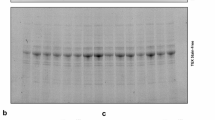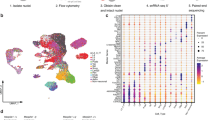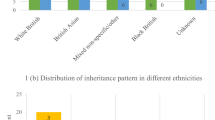Abstract
Mutations in the CDKL5 gene (also known as STK9) have recently been shown to cause early onset epilepsy and severe mental retardation (ISSX or West syndrome). Patients with CDKL5 mutations sometimes also show features similar to those seen in Rett Syndrome (RTT). We have screened the CDKL5 gene in 94 patients with RTT or a RTT-like phenotype who had tested negative for MECP2 mutations (13 classical RTT female subjects, 25 atypical RTT female subjects, 40 RTT-like female and 16 RTT-like male subjects; 33 of the patients had early onset seizures). Novel pathogenic CDKL5 mutations were identified in three girls, two of whom had initially been diagnosed with the early onset seizure variant of RTT and the other with early onset seizures and some features of RTT. In addition, the 33 patients with early seizures were screened for the most common mutations in the ARX gene but none were found. Combining our three new cases with the previously published cases, 13/14 patients with CDKL5 mutations presented with seizures before the age of 3 months.
Similar content being viewed by others
Log in or create a free account to read this content
Gain free access to this article, as well as selected content from this journal and more on nature.com
or
References
Kalscheuer VM, Tao J, Donnelly A et al: Disruption of the serine/threonine kinase 9 gene causes severe X-linked infantile spasms and mental retardation. Am J Hum Genet 2003; 72: 1401–1411.
Weaving LS, Christodoulou J, Williamson SL et al: Mutations of CDKL5 cause a severe neurodevelopmental disorder with infantile spasms and mental retardation. Am J Hum Genet 2004; 75: 1079–1093.
Tao J, Van Esch H, Hagedorn-Greiwe M et al: Mutations in the X-linked cyclin-dependent kinase-like 5 (CDKL5/STK9) gene are associated with severe neurodevelopmental retardation. Am J Hum Genet 2004; 75: 1149–1154.
Scala E, Ariani F, Mari F et al: CDKL5/STK9 is mutated in Rett syndrome variant with infantile spasms. J Med Genet 2005; 42: 103–107.
Strømme P, Mangelsdorf ME, Shaw MA et al: Mutations in the human ortholog of Aristaless cause X-linked mental retardation and epilepsy. Nat Genet 2002; 30: 441–445.
Weaving LS, Ellaway CJ, Gécz J, Christodoulou J : Rett syndrome: clinical review and genetic update. J Med Genet 2005; 42: 1–7.
Kammoun F, de Roux N, Boespflug-Tanguy O et al: Screening of MECP2 coding sequence in patients with phenotypes of decreasing likelihood for Rett syndrome: a cohort of 171 cases. J Med Genet 2004; 41: e85.
Hanefeld F : The clinical pattern of the Rett syndrome. Brain Dev 1985; 7: 320–325.
Goutieres F, Aicardi J : Atypical forms of Rett syndrome. Am J Med Genet 1985; S1: 93–94.
Evans JC, Archer HL, Whatley SD, Kerr A, Clarke A, Butler R : Variation in exon 1 coding region and promoter of MECP2 in Rett syndrome and controls. Eur J Hum Genet 2005; 13: 124–126.
Allen RC, Zoghbi HY, Moseley AB, Rosenblatt HM, Belmont JW : Methylation of HpaII and HhaI sites near the polymorphic CAG repeat in the human androgen-receptor gene correlates with X chromosome inactivation. Am J Hum Genet 1992; 51: 1229–1239.
Hagberg B, Hanefeld F, Percy A, Skjedal O : An update on clinically applicable diagnostic criteria in Rett syndrome. Eur J Paediatr Neurol 2002; 6: 293–297.
Huopaniemi L, Tyynismaa H, Rantala A, Rosenberg T, Alitalo T : Characterization of two unusual RS1 gene deletions segregating in Danish retinoschisis families. Hum Mutat 2000; 16: 307–314.
Villard L, Kpebe A, Cardoso C, Chelly B, Tardieu P, Fontes M : Two affected boys in a Rett syndrome family. Neurol 2000; 55: 1188–1193.
Steffenburg U, Hagberg G, Hagberg B : Epilepsy in a representative series of Rett Syndrome. Acta Paediatr 2001; 90: 34–39.
Acknowledgements
We thank the patients, families and clinicians who helped in this study. Thanks also to Julie Maynard and Vikki Humphreys for technical assistance. This work was funded by the Health Foundation, a healthcare charity.
Author information
Authors and Affiliations
Corresponding author
Additional information
Supplementary Information accompanies the paper on European Journal of Human Genetics website (http://www.nature.com/ejhg)
Rights and permissions
About this article
Cite this article
Evans, J., Archer, H., Colley, J. et al. Early onset seizures and Rett-like features associated with mutations in CDKL5. Eur J Hum Genet 13, 1113–1120 (2005). https://doi.org/10.1038/sj.ejhg.5201451
Received:
Revised:
Accepted:
Published:
Issue date:
DOI: https://doi.org/10.1038/sj.ejhg.5201451
Keywords
This article is cited by
-
CDKL5 Deficiency Disorder-Related Epilepsy: A Review of Current and Emerging Treatment
CNS Drugs (2022)
-
Altered network and rescue of human neurons derived from individuals with early-onset genetic epilepsy
Molecular Psychiatry (2021)
-
A kinome-wide screen identifies a CDKL5-SOX9 regulatory axis in epithelial cell death and kidney injury
Nature Communications (2020)
-
PhenPath: a tool for characterizing biological functions underlying different phenotypes
BMC Genomics (2019)
-
Key issues in Rett syndrome: emotional, behavioural and autonomic dysregulation (EBAD) - a target for clinical trials
Orphanet Journal of Rare Diseases (2018)



